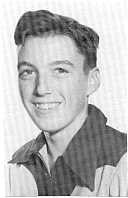LEON R. "PETE" SINCLAIR
In the mid-depression year 1935,my parents went down from Maine to
Boston to enter me into
the marathon of life. The nineteen years of
relative though not abject
poverty that followed were important in ways ,
I understand only dimly.
For one thing, my parents provided me with
love and necessities but
no illusions - nor did they make special demands
because of advantages
provided. For another, money has never been a very
complicated problem for
me because I have never had more than I needed.
Somehow my parents recognized
that a world that contained the depression and WWII had limitations enough
without artificial parental ones. I was given enough freedom of choice
that I could make mistakes.
Then there was school. I once calculated that I have spent about 19,000
hours sitting in class. I have learned from experience and from books.
We were not allowed to read books in class, and I experienced most of what
is available to experience in class by the end of the first grade. In class
they were pleased if I sat down, shut up and put up with boredom. Insofar
as this describes the intent of mass public education, I remain unlearned.
I entered Dartmouth in 1954 with an unquenchable thirst for adventure.
The impression of higher education I had gathered from various sources,
teachers, novels, movies, catalogue copy, sentimental alumni, extrapolation
from the fun I had in the town library, led me to hope
that college was the place
for adventuresome young men. On the other hand I had already been in school
quite a while now just to be safe, I took up rock-climbing. Two years later
I accepted my identity and dropped out. Then followed: the Army, another
quarter at school, hitch-hiking to Wyoming in December, learning to ski,
job as professional patrolman, roughnecking in oilfields, climbing and
work in Alaska as guide and game warden, then to Mexico, back East, back
West, Park Ranger, mountain rescue, back East, back West, construction
work, janitor, bartender, cowboy, married, finished school at Wyoming,
mountain guide, University of Washington for Ph.D., teaching at Wyoming,
Evergreen.
Success, unlike money, has complicated my life. I have always managed to
do what I set out to do (with a couple of setbacks) and- compared to the
serenity of my childhood - each gain has entailed a loss of peace of mind.
My hope is that Evergreen has ended that pattern. There is a possibility
here of defining success as becoming more competent, doing better work,
not rising in a hierarchy. For the first time I can see myself doing what
I am doing for the rest of my life.
«»
